Planning on trekking to the base of the world’s tallest mountain? This Everest Base Camp faqs covers all your queries on the popular Everest Base Camp trek. Whether you want to know when is the best time to go, fitness required for the trek, or want a clear overview of trip inclusions, find answers to our most frequently asked questions from our adventurous staff, guides, and mountain experts right here. So, sit back, dive in and start planning the trek of your lifetime.
Everest Base Camp FAQs
1. Is this trek too difficult or dangerous?

Yes and no. Yes; because altitude can kill people so care must be taken to acclimatize properly. No; from the lack of so-called “objective” danger such as rockfall or crevasses normally associated with climbing. However, people have been seriously injured by yaks who inadvertently bump them off the trail and down a steep hillside. So always be on the uphill side when a yak passes by.
2. What is the Trek Route on the Everest Base Camp Trek?
The classic and most popular route to Everest Base Camp starts from Lukla, passing through Namche Bazaar and then heading up to Lobuche from Dingboche and then finally to Gorakshep. This classic Everest Base Camp route is extremely popular and easier.
The other route that is less commonly opted for is Everest Base Camp through Gokyo Ri and Chola Pass. This is slightly more challenging but has brilliant views of the Gokyo Lakes and the chance to summit Gokyo Ri.
The route that we opt for on our Everest Base Camp trek is this:
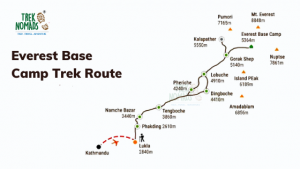
3. Does the trek require any kind of training?
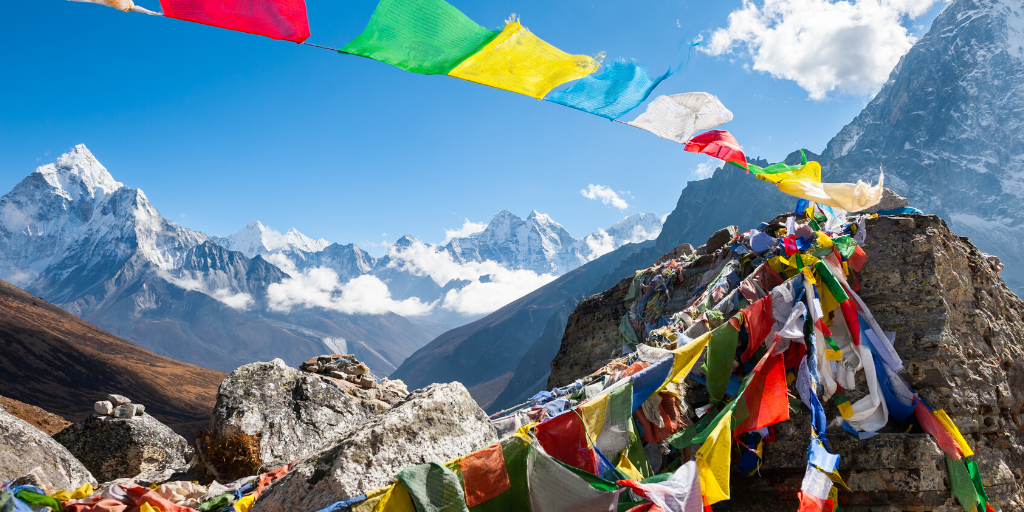
Yes. This trek requires a good level of fitness. If you’re not already following a fitness regime, you would need to follow the regime that is shared here with you. The training routine is spread over four months and you would be expected to work out at least 4 times a day. The regime is designed to help you climb smarter even in higher altitudes. The regime consists of a good combination of exercises that works on all parts of your body including – Upper Body, Core, Endurance, Lower Body, Shoulder strength, and streamlining your breathing pattern. When followed religiously, you can rest assured that you will be ready for the trek. Not only does this regime help you with the trek, it will also help you inculcate a sense of fitness in your day-to-day life.
4. Is there a diet plan that we should follow to train for EBC?
Eating right amounts to 70% of the effort you put into getting fit. A good nutritious diet can help your body sustain the pressure that it will be going through during the trek and during your workouts. If you wish to know more about what to eat during the course of your fitness regime, you can get in touch with our trek captain.
5. What about acclimatization to the higher altitude?
The mountains are the gateway to exploring the abundant beauty that nature has to offer and every year, millions of people go up to the mountains to trek. While the fun and excitement are unparalleled, there is always one uncertainty that every trekker, professional or amateur has when it comes to high altitude trekking. And that is Acute Mountain Sickness, or commonly termed in the trekking community as AMS. Being physically fit helps in preventing AMS to a certain extent (does not, however, rule out AMS entirely).
Some of the symptoms you can experience when you have AMS are:
- Headache
- Disturbed sleep
- Loss of appetite/nausea
- Shortness of breath
- Cough
- Palpitation
- Swelling of the hands and face
Acetazolamide (Diamox): (a tablet that helps prevent AMS) will be given to you every night before every trek, this will help your respiratory system acclimatize to the altitudeAMS does not discriminate between new and experienced trekker, if you start showing any of the symptoms mentioned above, please inform your trek lead immediately.
Our trek guides and leads have been trained in basic first aid. In case you feel like you’re experiencing any of the symptoms mentioned above, please let the trek guide/lead know immediately so we can effectively monitor you.
Some tips to consider include taking your time, trekking at a slow and steady pace, and staying hydrated is important in reducing the effects of altitude sickness. Our trek leaders continually monitor travelers and ensure everyone is drinking plenty of fluids – continually replenishing drink bottles with clean drinking water, providing morning and afternoon tea, and offering juice for some electrolyte kick.
6. Are your staff equipped/trained & insured?
Yes! Our guides and porters are fully trained, equipped, and provided for. Our Trek Captain comes with the experience of doing the EBC trek priorly. Every member in a trekking group work as a team and take care of each other’s responsibility.
7. Is there an age limit to do the Everest Base Camp Trek?
When it comes to Everest Base Camp faqs, one of the most asked questions is if there is an age limit to do the trek. No, there is no age limit for Everest Base Camp trekking but, you need to be in good physical shape with a positive attitude. We also suggest you prior to the trek though we suggest you please see your doctor and obtain necessary permission and advice, as well as medications for traveling in extreme altitudes prior to the trek.
8. Should I carry a medical kit along with me?
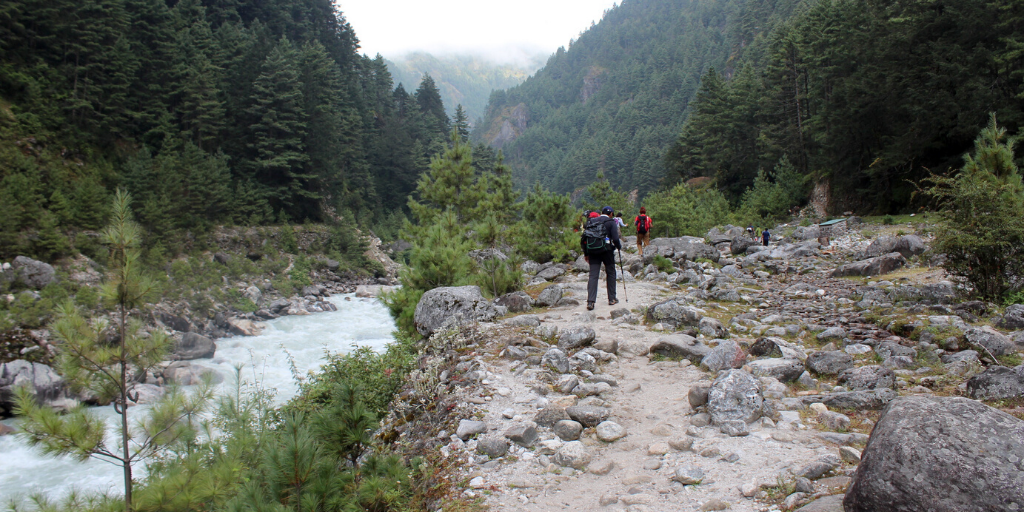
It is always better to consult your doctor. However, while we do carry a first aid kit, we suggest you carry simple medicines such as Ibuprofen, Codeine, Paracetamol, Strepsils, and anti-diarrhea tablets.
9. What about toilet facilities? Will I be able to shower during the trek?
Most of the teahouses on the Everest Base Camp trail have squat toilet facilities, but recently built lodges have western-style toilets as well. Nowadays, flush toilets are also being introduced with a number of increasing foreign mountaineers each year. It is highly recommended to carry your own toilet paper and other required toiletries.
Hot shower facilities are available till Gorakshep. The most common type is a bucket shower, a usual bucket with tap filled with hot water and placed in a shower room. Hot shower costs from USD 4 to 15 per use and the price increases along with the elevation. The attached bathrooms and toilets are not available unless you book for a luxury lodge during the EBC trek.
10. What do I need to know about the Nepal Visa?

For citizens of countries other than India, you will be required to purchase a Visa. The cost for the Visa can range anywhere between USD 30 – USD 50 depending on the number of days you need to be in Nepal. We always recommend getting the 30-day Visa since there could be a possibility of delays and setbacks during the trek.
11. What if I am not able to do the trek?
Our guides will make the required efforts to obtain the necessary transportation and reservations to get you home as quickly as possible if for any reason you need to depart early. However, you will not be entitled to any refund for the services (such as hotel, transport, flight, etc.) included in the package that you would not use later.
12. What about ATM on the trail?
ATM services are available only in Namche Bazaar and Lukla. However, the services might not work or run out of cash. Therefore, we suggest you carry a small amount of money to buy snacks, etc. during the trek.
13. What kind of weather can I expect during trekking? How cold does it get?
The temperatures in September can range from 28° to – 10°, depending on the altitude. Make sure you stay warm and dry at all times.
14. What type of adapter will I require in order to plug my electrical equipment?
Most of the tea houses/ lodges have electricity whereby you will be able to charge your iPod or camera batteries. Please note that lodges/tea houses will charge you some extra money for the services. The fee may vary from USD 1 to USD 3 per hour.
15. Are there any communication facilities available while we are on the mountain?
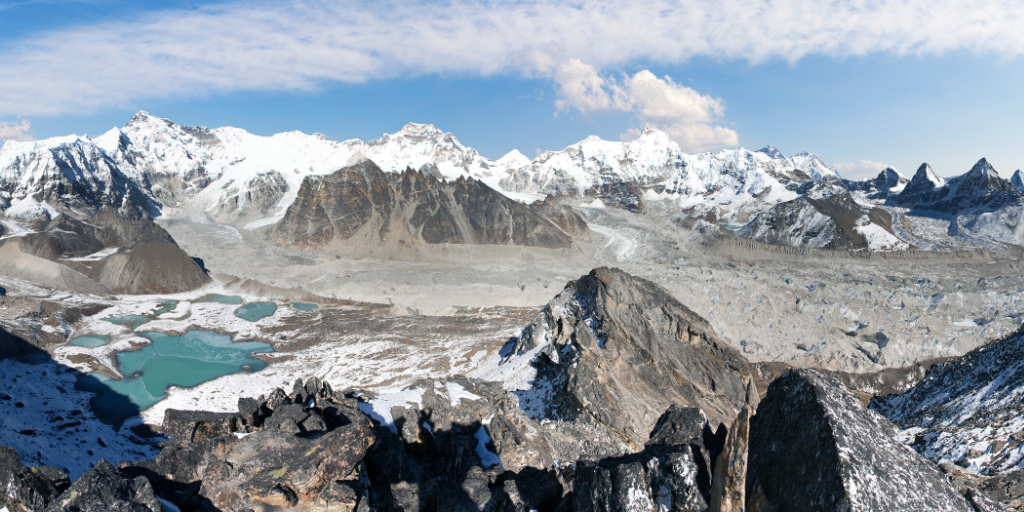
There are telephones (landlines) in most of the villages along the trek routes from where you can make international calls. Mobile Phone services are available throughout Nepal and even at the Everest Base Camp but the quality of the reception varies from location to location. Internet facilities can be found in only a few villages. However, these facilities can be expensive. Our guides will carry mobile phones which also can be used by you when/if necessary (these calls would be chargeable).
16. What is the perfect time to trek to EBC?
There are two seasons when you can trek to Everest Base Camp. The first is from April – May (Spring) and the second is October – November (Autumn). The latter is considered to be a post-monsoon time and chances of it raining through the trail are lower. The Sagarmatha region is in full bloom during the autumn giving you a palette of colors that you can enjoy. The spring season sees plenty of indigenous species that are in a colorful display and in full bloom.
17. Is there Wi-Fi on the trail?
You can get Wi-Fi access at Namche, Dingboche, Lobuche, Gorak Shep and Lukla. Again, some locations may charge a small cost for its use.
18. What is the average size of the group?
Groups can vary between 6 to 14 Nomads, who are typically are a mix of individuals, couples, or friends trekking together. Ages differ from people in their 20’s up to their 50’s. The Everest Base Camp & Kala Pattar trek is a highly popular trip with all dates guaranteed to depart.
19. Tipping System in Nepal
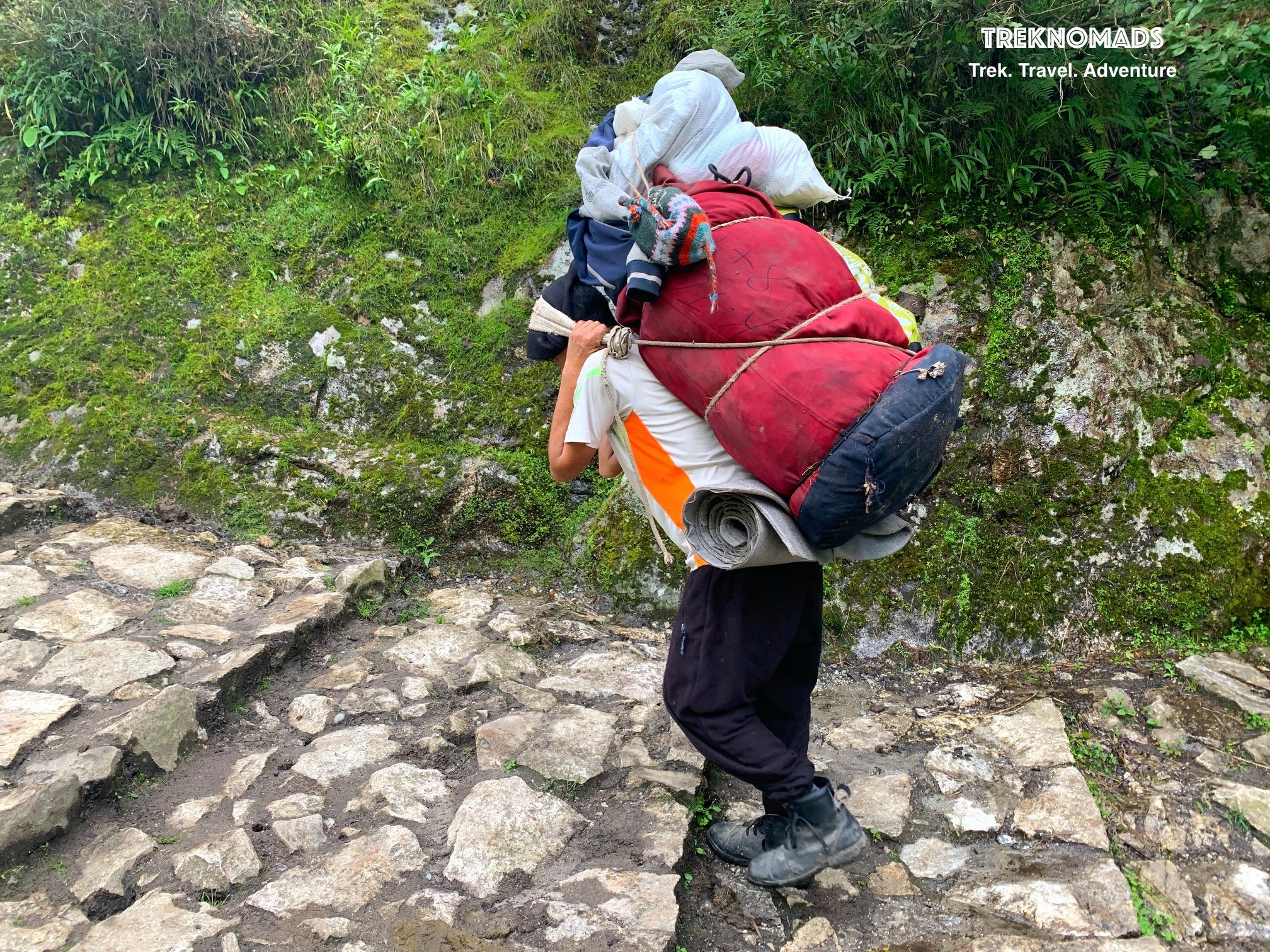
As of what we understand, there is no tipping system in place as compared to rules in other countries where porters MUST be given a certain amount of tip for the work they’ve done by every trekker. When trekking with us, we strongly follow the unsaid rule of tipping well. While the amount to be tipped is at your discretion, we always encourage our trekkers to tip more if they’re happy with the porter’s service. To give you an example, you can tip from anywhere between Rs 100 – 500 per day (depending on your comfort).
As a part of this Everest Base Camp faqs blog, here are a few things you can keep in mind when you think of tipping in Nepal:
Tipping Etiquette
There are a few things that you need to keep in mind while tipping the porters or guides in Nepal.
Handing over the money
Always hand over the money with your right hand, as using your left hand for this is considered to be rude in Nepal.
Tip Discreetly
It’s always better to tip your porter at the end of the trek, in which case, we suggest that you use an envelope, this will not only make them feel good about the tip, it will also give them a sense of respect. If you wish to tip smaller amounts, it’s always better to tip without creating a scene or saying it out loud.
Tipping doesn’t necessarily mean money
During your trek, it’s always a good sense to tip porters with food such as chocolates, energy bars, dry fruits, water, etc. After your trek, you can always leave behind your gear, clothes, shoes etc. that can be extremely helpful to these porters as they would never be able to invest in these otherwise.
The unsaid rule of weight
On our treks, we’ve seen porters more than 80 kilos of weight up and down the trail. While there is no rule in Nepal to check how much each porter can carry, it is always advised that as trekkers, you do not overburden them with heavy luggage. You can even do a ratio of one porter for two trekkers to ensure that they are not carrying too much weight.
20. What to Expect on a trek to EBC

The Everest Base Camp trek is a challenging trek that requires prior Himalayan trekking experience. During the course, we will trek 4 to 10 hours per day on moderate to steep grades, at varied elevations. Some days will be rest days with optional hikes to properly acclimatize, while on other days you will continue your journey towards EBC. Your Trek Captain will set a suitable pace to minimize the risk of altitude issues. Porters and pack animals will transport your gear. A signed medical consent form from your doctor will be required for participation. You will also be required to sign an indemnity bond before heading on the trek.
With this Everest Base Camp guide, we hope that you have understood the various aspects of trekking in the Everest region.

21. Accommodation & Food During the Trek

While the common way of living along the trail is by camping, but on our trek, you get to enjoy staying at double-sharing wooden teahouses. The rooms will be comfortable with basic amenities. Blankets and fresh sheets will be given.
As the cost of food on the Everest Base Camp Trek gets extremely expensive, a good package inclusive of food can do you so much help. Basic continental food will be available all along the trail. You can also binge on Nepali delicacies like – Dal Vat Tarkari etc. Indian food will be scarce along the trail.

22. Does the Everest Base Camp trek include trek insurance?
No, insurance is not covered in the trek fees. If you are interested in getting an insurance cover, you can let us know of the same and we will take care of it for an added cost through our insurance partner.
This brings us to the end of the Everest Base Camp faqs blog. We hope that this answered all your questions. If you have any more questions, drop us a comment below and we will answer your query!
Happy Trekking!
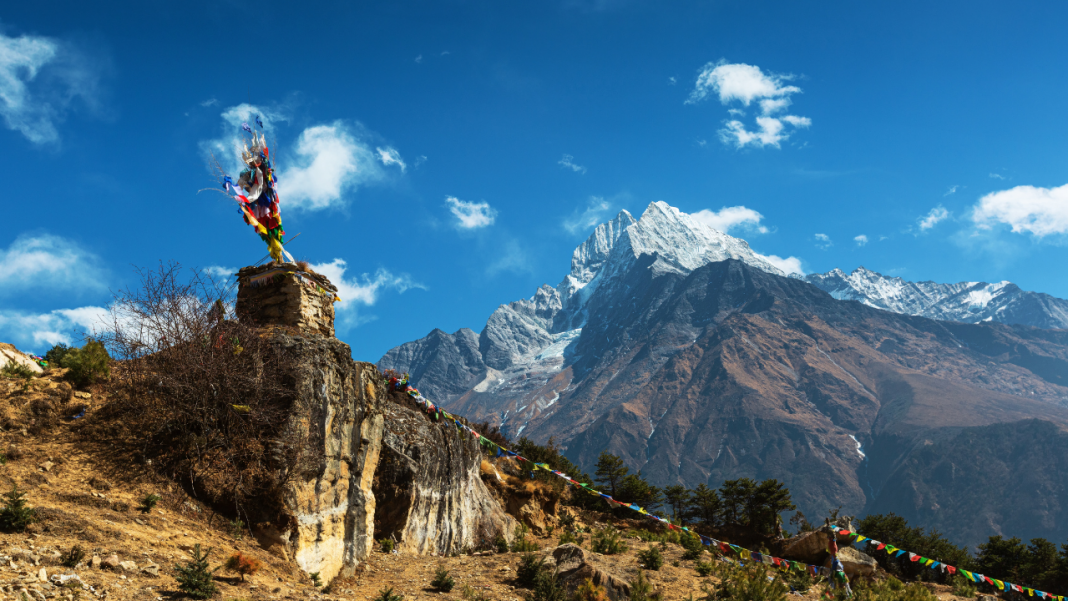
[…] Recommened Reading: Everest Base Camp FAQs […]